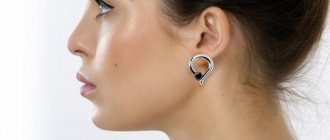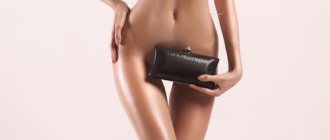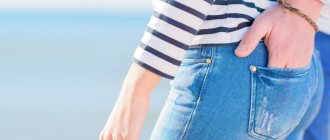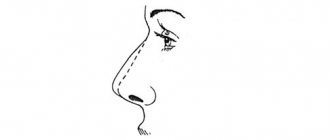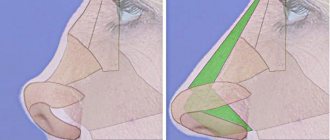Anatomy of the nose
The visible part of the nose consists of: the back, wings, tip and nostrils.
Anatomy of the visible part of the nose
The internal structure of the nose is a little more complex.
The nasal bone consists of 2 segments, connects in the middle and forms the bridge of the nose in its upper part.
The cartilage continues the nasal bone, forming the tip and wings of the nose. The septum is a cartilaginous plate that internally divides the nose into two halves.
The tip of the nose meets the columella , which forms and separates the nostrils. It consists of skin and cartilage.
If you hold the tip of your nose, you can move it in different directions. The cartilages of the nose are quite mobile and plastic.
Cosmetic gymnastics
The author of the Facebook building technique, Carol Maggio, believes that gymnastics will help remove a hump on the nose at home without surgical intervention. To do this, perform the following exercises every day:
- The bridge of the nose in the area of the defect is grasped with the index finger and thumb. Apply gentle but firm pressure to the area. The fingers are held in this position for a minute.
- Place your index finger on the tip of your nose. The tip is raised up, while lowering the lips and chin down. In this case, resistance should arise in the area to which the impact is directed. The exercise is repeated 35 times.
Doctors consider gymnastics ineffective. It is aimed at strengthening the muscles that are scarce on the nose. The hump consists of osteochondral tissue, so working with the muscle components does not affect its size. Despite this, followers of face-building notice results with constant exercise.
Hump of nose
The hump is formed at the junction of the nasal bone and cartilage and is clearly visible in profile.
A hump can appear for three reasons:
- The bones and cartilage of the nose have grown together incorrectly after a bruise or fracture
- The hump of the nose is genetically determined and inherited
- Unsuccessful rhinoplasty – a hump may appear due to an incorrectly planned operation
Anatomy of the nasal hump
Causes of a hump on the neck
A hump on the neck develops for several unrelated reasons. Therefore, the means of influence and the effectiveness of their use vary greatly.
- excess body weight,
- hormonal imbalance.
- “buffalo hump” in men is the result of uneven accumulation of adipose tissue in the upper back due to lipodystrophy,
- metabolic disorders - for example, insufficiency of enzymes responsible for the metabolism of fats,
- taking toxic medications, such as protease inhibitors
- hormonal drugs for the treatment of arthritis and AS, Beclomethasone, Budesonide, Fluticasone, Hydrocortisone and others.
- the consequence of sedentary work is deformation of the cervical spine.
For example, after childbirth, the level of estrogen, which stimulates the breakdown of lipids, decreases. As a result, fat traps on our body, which include the area at the base of the neck, begin to accumulate fat.
“Widow’s hump” or “menopausal hump” in women after 45 years of age is also caused by a decrease in estrogen during menopause. Opsteoporosis, which develops against the background of menopause, also makes its contribution - the leaching of calcium leads to curvature of the neck and increases the severity of the hump.
The hump against the background of Itsenko-Cushing's disease also has a hormonal nature.
Diagram of the development of a “widow’s hump” on a woman’s neck
How to get rid of a hump nose
There are two ways to get rid of a hump in the nose: with fillers or rhinoplasty.
Fillers are an injectable drug for the correction of cosmetic defects.
Nose correction with fillers is a quick and easy option that can help improve the appearance of your nose for a short period of time. Using fillers, you can straighten the bridge of the nose, correct the tip of the nose, and fill in uneven spots.
Rhinoplasty is a plastic surgery to correct the shape of the nose and change the anatomy to improve breathing.
Unlike fillers, with the help of rhinoplasty you can solve all problems at once and forever:
- Remove hump
- Make your nose smaller
- Align the nasal septum
- Improve nasal breathing
- Change the shape of the tip of the nose
Open or closed hump surgery?
Open and closed rhinoplasty
From the patient's point of view , the only difference is in the incision. With open rhinoplasty, the incision passes through the nasal passages inside the nose and along the columella, and with closed rhinoplasty, only through the nasal passages.
Many people are convinced that after open rhinoplasty there will be visible scars on the columella. But in fact, scars are practically invisible, and over time they disappear without a trace.
From the surgeon’s point of view , the difference is that with closed rhinoplasty, the surgeon acts blindly, but with open rhinoplasty, he sees and controls everything.
Open rhinoplasty provides predictable results and allows for precise changes to the internal anatomy of the nose. That's why I only perform open rhinoplasty.
Look at my case, take a special look at the columella.
Scar 2.5 months after open rhinoplasty ©Dikarev Alexey Sergeevich
Rhinoplasty with fillers – how is the procedure performed?
This method involves the introduction of special preparations containing hyaluronic acid into the nasal area. The product fills in unevenness, so that the nose is leveled, acquiring symmetry. The fillers themselves are either absorbable (their effect wears off over time) or permanent (continuous action). Doctors do not recommend the use of permanent products, as their use can cause complications.
The procedure itself takes approximately 45 minutes. First, the face is treated with an antimicrobial agent, then with a mild anesthetic. After this, points are placed for future injections, then the drug itself is administered. As soon as the skin becomes sensitive, the patient can go home.
It is important to note that these manipulations will not help with severe defects. The duration of the procedure’s effectiveness is 9-12 months, then it can be repeated.
Septoplasty
Septoplasty is an operation to correct the nasal septum.
For most people, the nasal septum is initially uneven. Even if you think you have a perfectly straight nose, your septum may be slightly shifted, bent or pinched. Because of this, nasal breathing is limited.
Nasal septum
Septoplasty helps improve nasal breathing and get rid of various problems caused by a deformed nasal septum:
- chronic runny nose
- nasal congestion
- snore
Consequences of a hump
First of all, a hump on the back is a very noticeable defect, due to which a person develops various complexes, self-esteem decreases, and problems with communication arise. In addition, the hump causes inconvenience in everyday life, which also affects the quality of life. But the worst thing is that such a pathology affects internal organs and systems, often provoking irreversible changes. The hump changes the shape of the body, as a result of which the digestive organs and lungs are displaced and compressed, and the functioning of the heart is disrupted. Deformed vertebrae compress blood vessels and nerve fibers, the sensitivity of the limbs decreases, and disruptions occur in the urinary system. Due to lack of blood supply and reduced passage of nerve impulses, the brain also suffers.
Changes in the spinal column cause pain and impair blood supply to the brain
This manifests itself as back and chest pain, headaches, dizziness, heart rhythm disturbances, digestive and genitourinary problems.
Advice. These symptoms do not appear immediately, but as the hump grows and the impact on nearby organs increases. But, of course, you cannot wait until the symptoms become pronounced, and you need to seek help as early as possible.
Alignment of the nasal bridge
In order to remove the hump, I use a scalpel and an osteotome.
An osteotome is a surgical instrument used to cut bone.
I remove the cartilage tissue with a scalpel, and excise the nasal bone with an osteotome.
Removal of nasal hump
In this case, we make the back even by removing the hump, i.e. we lower it. But if you have a snub nose, removing the hump is not enough. For such cases I use a special technique.
Preparation for rhinoplasty
Consultation with a plastic surgeon, 3D modeling
In plastic surgery, the preparatory period for surgical intervention is important. It starts with an initial consultation. At the appointment, the surgeon examines the patient, takes photographs, listens to wishes for the future nose, and makes recommendations. After examination and assessment of the condition of the nasal tissues, the surgeon determines to what extent the desired rhinoplasty can be performed and how to correct the shape.
3D modeling helps you visualize what your nose will look like after correction. To do this, photographs of the face are taken in three projections: full-face, half-profile and profile. The photographs are entered into a program that models a three-dimensional image of the face. On it you can “design” according to size and clearly demonstrate not only the new nose, but the entire appearance. However, plastic surgeons warn that in reality the result may differ, because the program does not take into account the internal structure of the nasal passages and the individual characteristics of the body during recovery. Using 3D modeling, the volume of surgical intervention is determined.
Often, when correcting a hump, plastic surgery of the tip of the nose is additionally required. This is necessary so that a straight nose looks aesthetically more attractive and does not appear long.
If the patient has initial breathing problems, hump correction is performed together with septoplasty - restoration of a deviated nasal septum.
Analyzes and research
Before surgery, you must undergo examinations and tests:
- blood for biochemistry, Rh factor and group;
- general blood analysis;
- blood test for prothrombin;
- tests for hepatitis B, C, RW (syphilis), HIV;
- ECG;
- radiography of the paranasal sinuses.
The surgeon must know about all chronic diseases, allergies, and bad habits. This information is collected by the doctor during a history or interview. If you have chronic diseases, he may prescribe other tests.
When preparing for plastic surgery, the surgeon develops an operation plan.
Restrictions
- For a month before rhinoplasty, avoid sun exposure and do not visit the solarium.
- Do not do deep mechanical or chemical peeling for a month.
- Give up alcohol and smoking in two weeks.
- Stop taking medications, blood thinners, hormonal drugs, and antibiotics for two weeks.
- Buy contact lenses if you wear glasses.
- 24 hours before surgery, eat only light meals.
On the day of surgery you should not drink or eat. In the morning, take a warm shower and wash your face thoroughly. Decorative cosmetics cannot be applied. Remove all jewelry. If you have eyelash extensions, you need to remove them.
“Turkish delight” technique – for straightening the back of a snub nose
The essence of the technique is to straighten the bridge of the nose by raising it.
If you simply cut off the hump, the nose will look unnatural, the back will be concave - this is called a saddle nose.
Saddle nose surgery
In order to raise the bridge of the nose, I use grafts - grafts from the cartilage of the nasal septum.
I cut the nasal septum cartilage into small pieces and form a graft. It turns out to be a kind of “sausage” made from your own tissues. I attach the graft to the back of the nose.
Nasal dorsum graft
This method is vaguely reminiscent of correction with fillers. The essence is the same - filling in irregularities and raising the bridge of the nose.
Only correction with fillers needs to be performed every year, and the graft from your own tissues will be securely fixed and will not go anywhere.
Stabilization of the nasal bridge and improvement of breathing - the “Spreader graft” technique
To fix the nasal septum, widen the nasal passages and improve nasal breathing, I use grafts.
Most often, during primary rhinoplasty, nasal septum cartilage is used for grafts. If rhinoplasty has already been performed and there is not enough septal cartilage, auricular or costal cartilage is used.
Cartilage of the nasal septum, auricle, costal
Two strips of cartilage must be cut out to form grafts.
Grafts to improve breathing
Grafts are placed and sutured between the septum and the upper lateral cartilages.
Stabilization of the nasal tip - “Extended septal graft” technique
To stabilize the tip of the nose, I again use a nasal septum graft. The essence is the same as with grafts to improve breathing.
The graft is placed between the cartilages of the nasal wings and sewn to the septum to add strength.
Nasal tip stabilization graft
Installation of this graft helps to securely fix the tip of the nose to avoid changes in its position in the future. With age, the soft tissues of the nose begin to sag and the nose ages.
Aging nose
If necessary, I correct the wings and tip of the nose.
In what cases will the surgeon refuse correction?
Like any other surgical intervention, rhinoplasty has a number of contraindications. They are divided into absolute and relative.
The surgeon will refuse surgery in the following cases:
- diseases of the heart and blood vessels;
- hemophilia, other blood clotting problems;
- hypertension;
- age - up to 18 and after 40 years;
- liver, kidney failure;
- diabetes;
- pustular formations in the operated area (boils, acne);
- malignant neoplasms;
- mental illness.
Correction is not performed until the age of 18, since the formation of bone tissue is not yet complete until this age. However, there are exceptions. A nose job may be performed earlier in the event of injury.
After 55 years, rhinoplasty is not performed, since after this age the regenerative abilities of tissues decrease, healing progresses worse, and the risk of complications is high.
Relative contraindications include viral and bacterial respiratory tract infections, as well as pregnancy and lactation.
Reviews about hump rhinoplasty
Reviews from social networks and instant messengers
Video reviews
Independent reviews
Anonymous
I would like to express my deep gratitude to Alexey, even though he did not operate on me. I have a young daughter. Several years ago she had a serious accident, recovered, everything was fine, she was cured. But something terrible happened to her nose (during the accident there was a fracture and apparently something went wrong). The girl is still very young, but she has become so insecure and downtrodden. I kept saying that everything was fine, but I see it. I’ve already taken her to psychologists, but I see that it’s not helping (now I don’t understand what I was thinking, I can’t imagine how a psychologist would help). I started thinking about plastic surgery about a year ago, but for some reason I thought it was a pleasure only for the rich. I started looking at prices, doctors in the city and found Alexey. Moreover, I noticed him in some program, and there he was described like this! When I told my daughter about the idea, she burst into tears with joy, and we almost immediately went to the reception. Everything went very well! Alexey is a very sensitive, understanding and competent specialist. Thank you so much for restoring the girl’s self-confidence!
Diana
I always wanted to make my wide nostrils a little smaller, and I was terribly complex about this. An opportunity arose, including a financial one, and only thanks to Alexey did I regain confidence in my beauty. A knowledgeable doctor, polite and prudent staff at the Line clinic. The operation went quickly, unlike the preparation for it, here as everywhere else - tests, examination, consultations. After a month, the seams were completely worn out, and did not become inflamed, as in some people. Now I’ve forgotten that I once suffered with my nose. I recommend
https://www.tecrussia.ru/plasticheskie-hirurgi/krasnodar/2291-dikarev.html
Anonymous
In April I had rhinoplasty with Dikarev. The operation was successful, then she was under the supervision of medical staff for 2 days. Discharged for 3 - then a week of rehabilitation. I thought it would take longer. The doctor is a professional. You can really trust your face and not be afraid that it will warp))
https://23med.ru/doctors/plastic-surgeon/dikarev-aleksey-sergeevich
View all reviews
Preventive measures
If there are risk factors, following a few simple rules will help prevent the formation of a hump:
- you must constantly remember your posture, try to always keep your back straight;
- devote more time to physical activity, but without excessive tension of the spinal muscles;
Physical activity is very important for spinal health - Be sure to visit the pool at least once a week. Swimming develops muscles well and relieves pain in pathologies of the motor system;
- for sleeping, it is recommended to choose a moderately hard mattress and a low pillow, preferably an orthopedic one;
It is recommended to sleep on a hard mattress and a low pillow - include foods high in vitamins and calcium in your daily diet.
If you want to learn in more detail how to sleep properly on an orthopedic pillow, and also consider alternative treatment methods, you can read an article about this on our portal.
But the most important thing is to consult a doctor in a timely manner if something bothers you, and not try to solve the problem yourself. Many diseases have similar symptoms, but require different treatments, and only a specialist can accurately determine the cause and select the appropriate therapy.
Orthopedic mattresses
Here's something else interesting
Surgical treatment of bulging eyes - Olivari operation
How to remove a double chin and tighten your neck?
How to remove bags under the eyes? Lower blepharoplasty or fillers.
How to get rid of jowls? Lifting, SMAS-lifting, MACS-lift.
